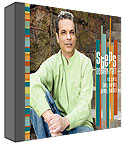Deepak Ram is a multitalented artist probably best known for his work in traditional North Indian classical music. He’s collaborated with musicians from around the world and is a gifted composer in his own right. Ram plays the bansuri, an alto flute from India, Pakistan, and Nepal. The bansuri has a deep tradition and is linked to the love story of Krishna and Radha. As the myth describes, the bansuri was said to be used by Krishna in his rasa lila (roughly translated to mean “performance play”) as he drove the women wild.
Deepak Ram learned to drive the women crazy in 1975 as he began his formal training under Sri Jeram Bhana in South Africa. Ram headed to Mumbai, India, two years later to continue training under India’s master flute maker, the late Sri Suryakant Limaye. Ram continued to study under several masters of the instrument, learning more each time. In 1996, he earned a Masters degree in music from Rhodes University in South Africa.
Since then, Ram has gone on to make albums that have explored his ingenuity and his technical dexterity with the bansuri. He has six solo albums to his credit and worked with various musicians, including Melvin Peters and Darius Brubeck. Ram’s bansuri is heard on various movie soundtracks, including The Fast And The Furious, Matrix Revolutions, and Stealth. His music is also featured on a variety of Indian films, including Maya.
With Steps, Ram explores the world of jazz. Naturally, the flute is nothing new in the world of jazz music. Herbie Mann, Charles Lloyd, and others have used the flute for decades. The bansuri, though, is just not something that pops up in jazz all that often. So when Deepak Ram pulls out his bansuri to take on Trane’s “Giant Steps” to open his album, things get real interesting real quick.
Ram might be the only person in history to have mastered “Giant Steps” on bansuri, but this simply reflects his life experience with one foot in ragas and the other ensconced in jazz. Ram’s roots in jazz probably have something to do with his upbringing in Sophiatown, a mixed area in South Africa where cultures mingled and many of South Africa’s best jazz musicians were born. With his home pulsing with a combination of Bollywood and his brother’s jazz records, Deepak’s love for music was predestined.
On Steps, Ram explores that combination and the results are exquisite. After “Giant Steps,” Ram pulls away on the affecting “Madiba’s Dance,” a song for Nelson Mandela. Madiba is a nickname for Mandela; it is his clan name and it is used out of respect. The song is dedicated to Mandela, as he is one of few presidents to stand in front of a crowd and dance. With rhythm everywhere in South Africa, it might be impossible not to dance. “Madiba’s Dance” is a special song for Deepak, who plays it to honour Mandela and his struggle
Following that is the Miles Davis-inspired “Blues for Shyam Babu.” Inspired by the blues changes in “All Blues” by Davis, this number has a touch of Bollywood flavour and was written after Ram saw a child who was just four minutes old. Shyam is another name for Krishna and Babu is akin to “mister.” The song’s gentle sway is moving and the touch of Miles inspiration is perceptible in its flow.
Gershwin is tackled up next with a South African shade and jazzy swing in “Summertime.” The bansuri pulls and sways like a slave woman singing the lyrics of the song to a little girl. Ram describes the song as having a feeling that resonated with apartheid in South Africa, so his tone reflects that conception and the results are striking and lingering.
The son of Dave Brubeck, Darius, penned the gorgeous song “October.” Coltrane is taken on again in “Naima,” as Trane’s inspiration is culled from Indian music on this number. Coltrane described his inspiration on the tune as wanting to echo Indian music. This led to some deep tones and a really full piece of music. Ram delivers the intricacy of the tune with refinement, allowing Trane’s composition to feel inclusive and seamlessly authentic.
Ram looks at Davis’ “All Blues” again and the muse of Kind of Blue is obvious. The bansuri works well with Davis’ classic recording because of the lack of chord changes. Its beauty is in its cleanness and Deepak Ram reflects that expressively. “All Blues” works because it lends itself physically to Indian playing.
The album closes with “My Funny Valentine.” Ram does a nice rendition of the Rodgers and Hart classic, pulling it in and treating it as though it were made for bansuri. Each track on Steps sounds like it was made for bansuri, come to think of it, as Ram plays the modal and breezy jazz with technical aptitude and natural sentiment.
With Ram’s bansuri coaxing freshness out of beautiful classics, Steps is a fantastic album for fans of world music, jazz, and blues. It breaks new territory for Deepak Ram and is a grand introduction to the flute master’s flair and proficiency with the bansuri. The backing band is great, with Vic Juris on guitar, Tony Marino on bass, and Jamey Haddad on percussion. Steps is a nice inclusive little recording that is adeptly executed and slickly rich in quality.
By: Jordan Richardson



